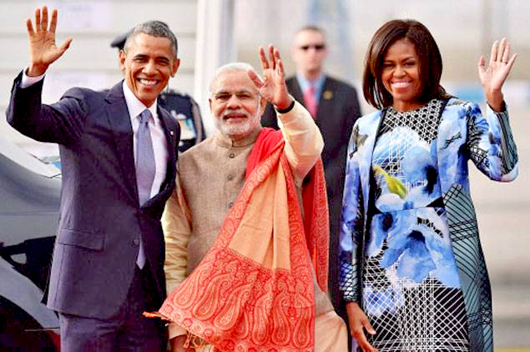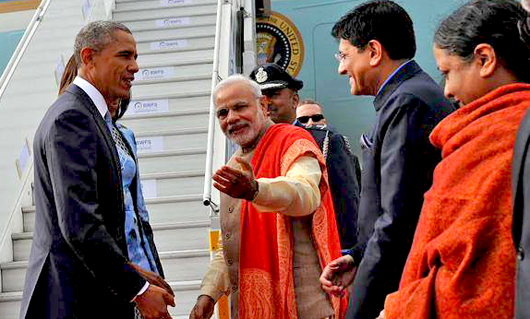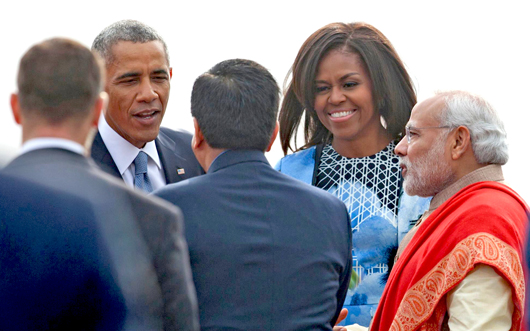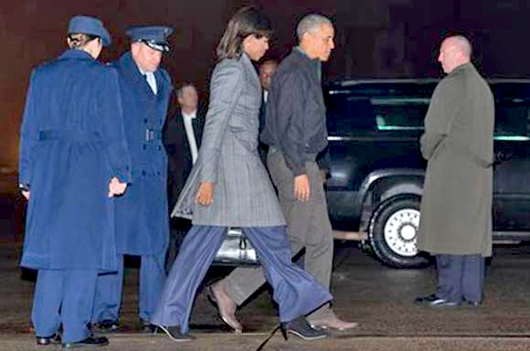
New Delhi, Jan 25: US President Barack Obama today arrived here on a three-day visit during which both sides will seek to break the deadlock in operationalising the civil nuclear pact, firm up a defence cooperation agreement besides broadening ties in areas like trade and investment.
In a departure from protocol, Prime Minister Narendra Modi received Obama, who was accompanied by his wife Michelle and a high-level delegation, at the Palam airport. Modi and Obama hugged each other, reflecting their personal chemistry.
Obama will be the first US President to grace the Republic Day parade as the Chief Guest tomorrow.
He will hold extensive talks with Modi on a number of strategic issues including ways to break the impasse in implementation of the civil nuclear deal and enhancing defence and economic ties.
Both countries are working hard to have "excellent" outcomes from the visit of Obama.
The two countries will also deliberate on ways to boost trade and economic ties as well as the crucial issue of climate change.
Both countries are working hard to have "excellent" outcomes during the visit.
Officials said "progress has been made" on the nuclear issue and India was looking forward to "effectively" work with the US in the "extremely important" field.
The Indian liability law holds the suppliers directly liable in case of a nuclear accident while countries like France and the US have asked India to follow global norms under which the primary liability is with the operator.
Since all the nuclear power plants in the country are run by the government-owned Nuclear Power Corporation of India Ltd, following international norms will mean the government would have to pay the damages in case of an accident.
Earlier this week, American Ambassador Richard Verma had noted that bilateral trade had grown five fold to USD 100 billion in the past decade, and added that, "We believe there is no reason it can't grow another five-fold, to USD 500 billion by 2020."
Climate change issue is also expected to figure prominently in talks between Modi and Obama.
Both Obama and Modi are also likely to discuss issues relating to India's neighbourhood as well as global issues.
Curtailing his India-visit, Obama had decided to skip a trip to Agra to see iconic Taj Mahal to be able to fly directly from New Delhi to Saudi Arabia following the death of King Abdullah.
An unprecedented security arrangement, comprising Delhi Police and para-military forces, has been put in place in the city.
Snipers of Delhi Police and National Security Guards occupied all high-rise buildings on the routes which Obama will be travelling.
Central Delhi has turned into a virtual fortress with security agencies partly or completely shutting down nearly 71 buildings. Even bonafide citizens of this area, including MPs and officers of the Armed Forces, have been either issued special passes or have to establish their identities to enter the zone.
A joint team of the US Secret Services and sleuths of central security agencies were monitoring specially established control rooms which are connected to freshly installed CCTVs for the VVIP.



Barack Obama arrives in India: 6 top points
New Delhi, Jan 25: U.S. President Barack Obama arrives in India on Sunday for the second time, to build on what he calls one of the defining relationships of the 21st Century. Following are some key areas likely to be discussed during his visit:
Strategic Importance
India’s size, location, fast-growing economy and potential as a democratic counterbalance to China makes the South Asian nation an increasingly important element of U.S. military and commercial strategy. Prime Minister Narendra Modi’s assertiveness in the region has already aligned India more with Washington, but they do not see eye-to-eye on Pakistan, and India is worried about the exit of U.S. troops from Afghanistan. India wants greater cooperation on terrorism and access to high-technology goods for civilian and military use.
Defence
The United States overtook Russia as the biggest weapons supplier to India, the Indian government said in August. India is the world’s biggest weapons importer. U.S. officials confidently predict deals will be unveiled on the trip, including possibly joint production of Raven drones and systems for Lockheed’s C-130 transport planes. Standing in the way of closer ties are Indian curbs on foreign companies owning majority stakes in defence companies and U.S. curbs on exporting certain technologies.
Civil Nuclear
U.S. and Indian officials are trying to unblock billions of dollars of potential trade in nuclear energy, but it’s not clear if an agreement can be reached in time for Obama’s visit. The two sides signed a landmark civilian nuclear deal in 2008. Holding up the trade is India’s reluctance to pass legislation shielding suppliers from liability in the event of a nuclear accident, a deviation from international norms.
Climate Change
The United States and India are expected to announce efforts to work together to combat climate change ahead of key global talks in Paris later this year. India, the world’s third largest carbon emitter, is reluctant to follow the United States and China in committing to a peak year for emissions on the grounds it needs economic growth to alleviate poverty. Instead, India is likely to trumpet its plans for a rapid expansion of renewable energy, for which it needs U.S. investment and technology, and improving energy efficiency.
Renewable Energy
India wants U.S. companies to help lead investments of $100 billion in renewable energy. Modi promised to help renewable energy companies overcome entry to the Indian market during his trip to Washington last year. A barrier to investment is a requirement that foreign companies make much of the equipment within India, which business leaders say will push up costs.
Economic Ties
Modi and Obama last year targeted a five-fold increase in annual trade to $500 billion. But U.S. business leaders have been frustrated by limits on their access to the Indian market, and battles over intellectual property protection. India and the United States have also filed several cases against each other at the World Trade Organisation over protection of their domestic steel, poultry and solar industries. India is trying to shed an image of arbitrary taxation on foreign companies and may be close to a bilateral tax deal with Washington.







Comments
Add new comment